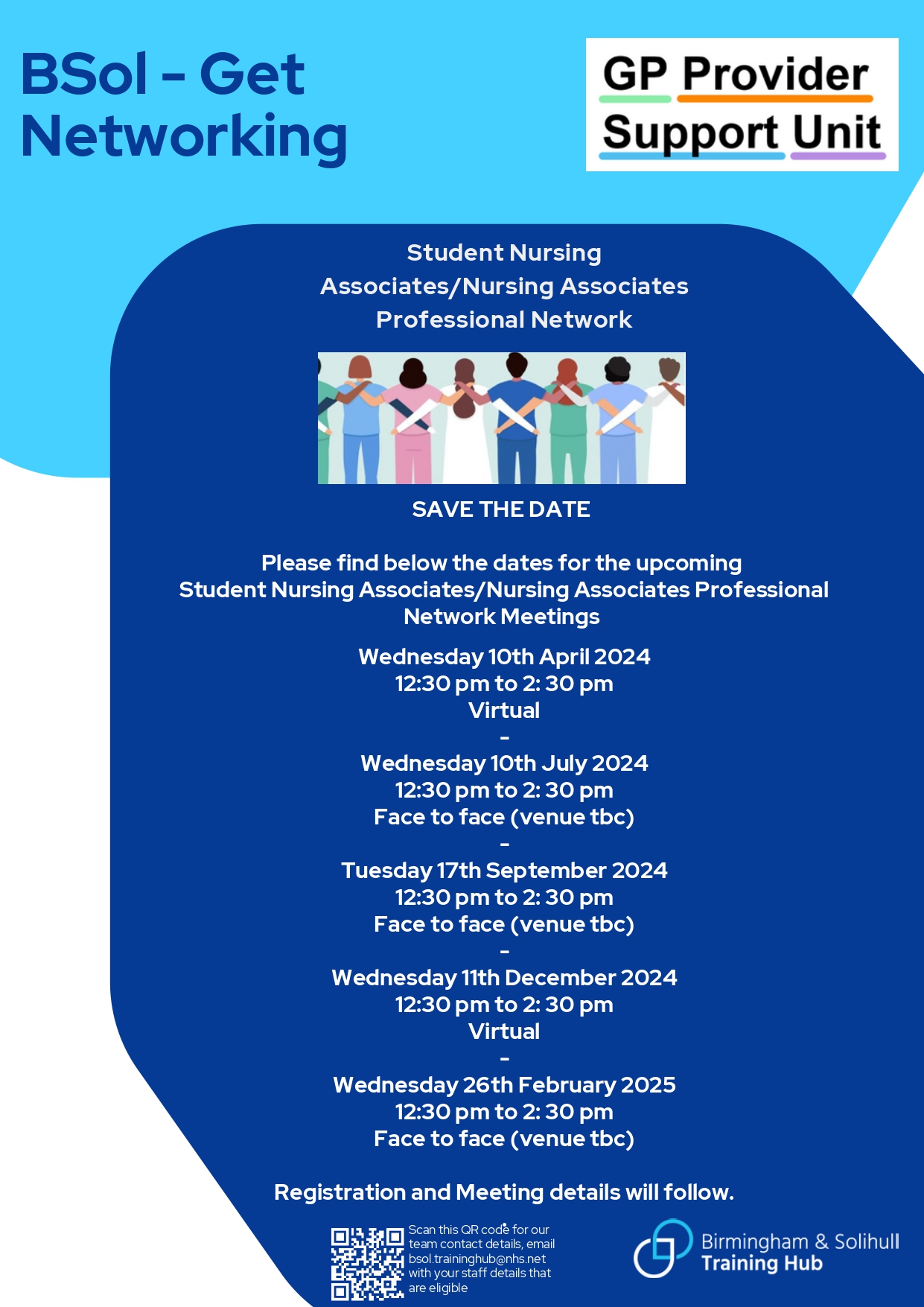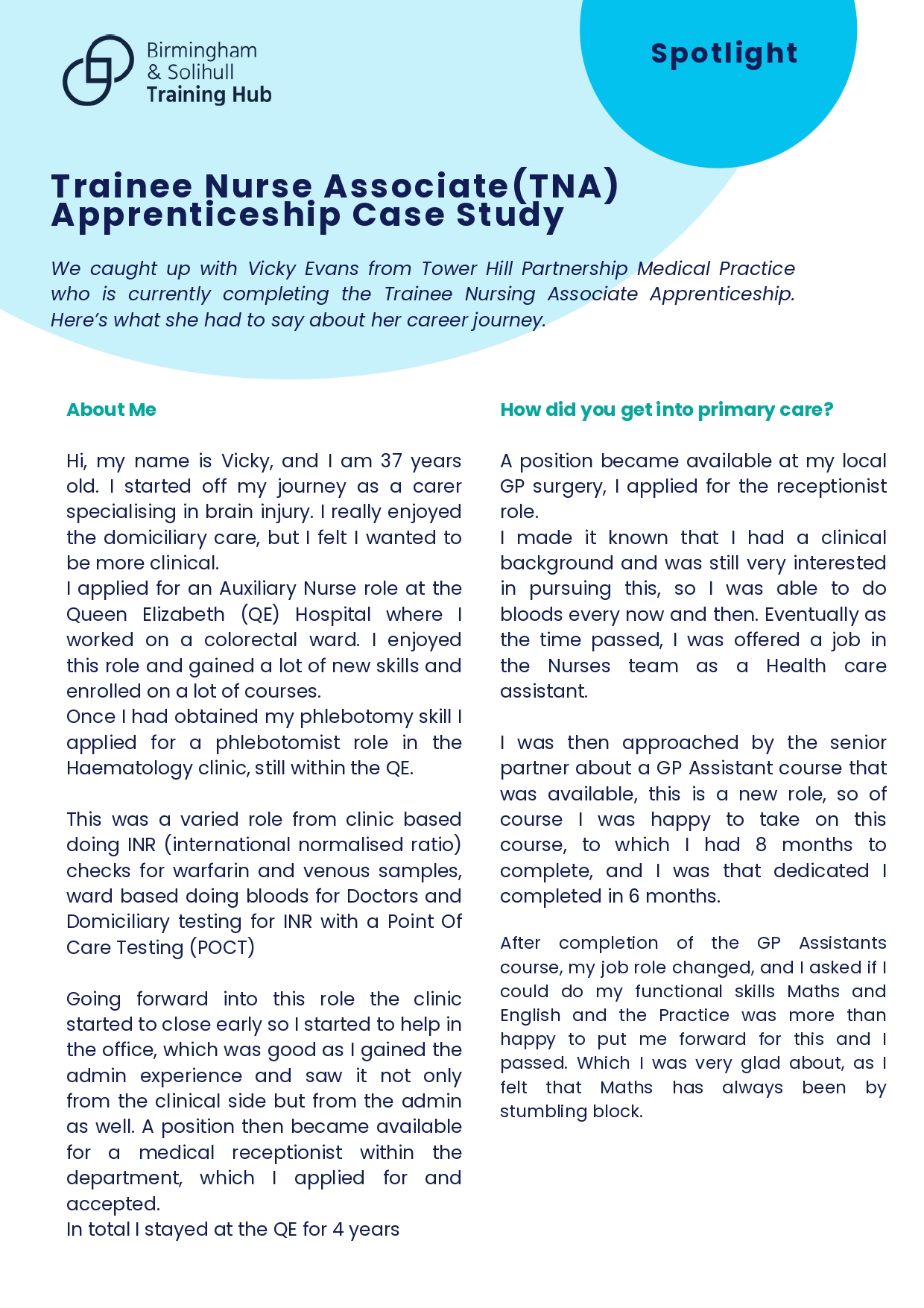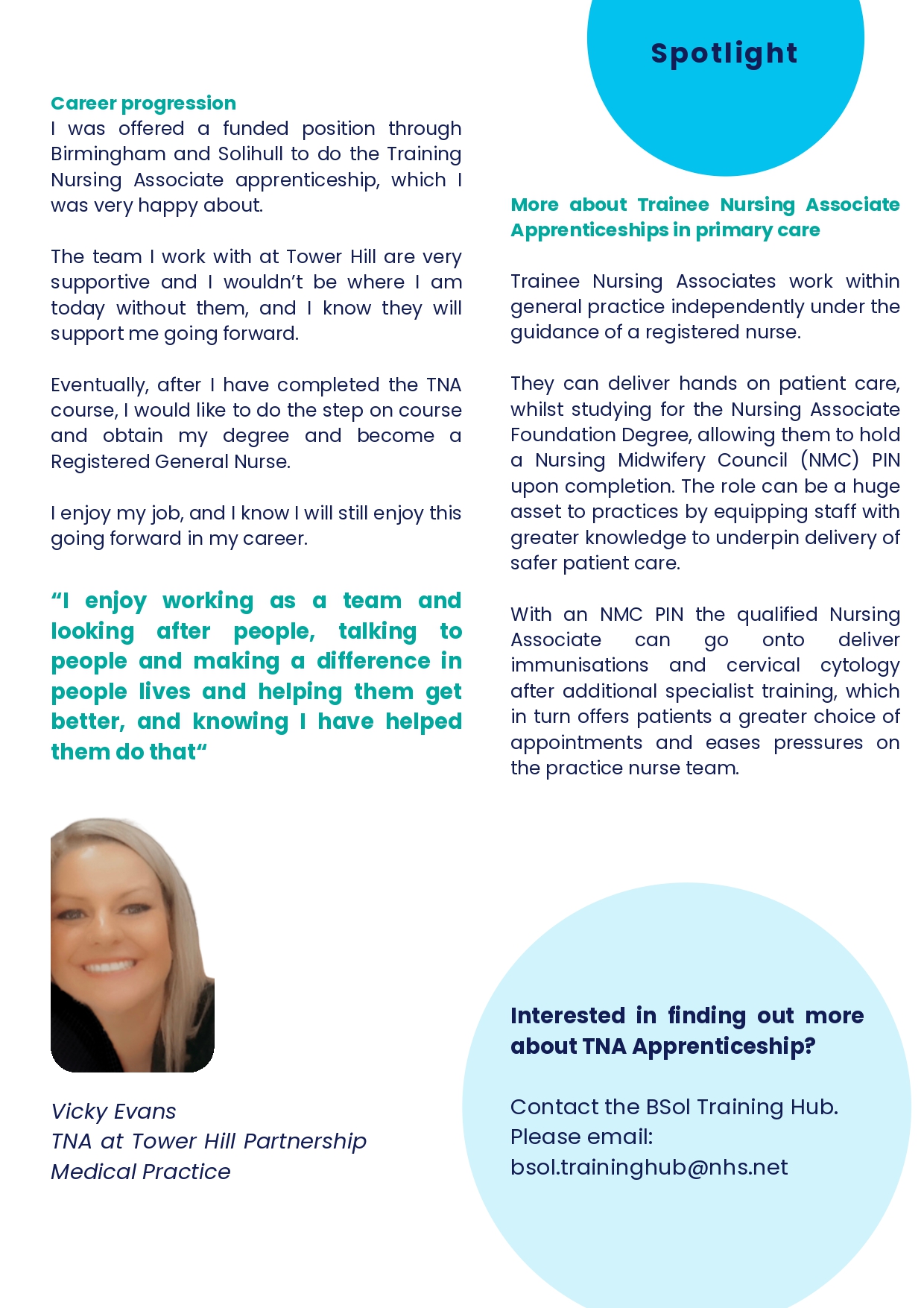Welcome
Nurse Associates
The nursing associate (NA) role was introduced in England to bridge the gap between health care assistants and registered nurses.
Nursing associates are members of the nursing team, who have gained a Nursing Associate Foundation Degree awarded by NMC The role has been introduced to help build the capacity of the nursing workforce and the delivery of high-quality care while supporting nurses and wider multidisciplinary teams to focus on more complex clinical duties.
Nursing Associates hold a pivotal role within the broader health and care team, providing crucial support in several areas. They facilitate the advancement of healthcare support workers’ careers, allow nurses to concentrate on more intricate clinical tasks, and contribute to expanding the nursing workforce by offering a pathway towards becoming a qualified nurse.
Employers who incorporate the nursing associate role into their overarching workforce planning and skills diversification strategies stand to gain numerous advantages. These include improved service delivery and enhanced patient care quality, a boost in staff retention due to expanded career growth prospects, the opportunity to cultivate an internal nursing workforce, and an investment in a well-established training programme accredited by the NMC (Nursing and Midwifery Council).
Nurse Associate Apprenticeship Information
The nursing associate (NA) role was introduced in England to bridge the gap between health care assistants and registered nurses.
Nursing associates are members of the nursing team, who have gained a Nursing Associate Foundation Degree awarded by the NMC. The role has been introduced to help build the capacity of the nursing workforce and the delivery of high quality care, while supporting nurses and the wider multi-disciplinary teams to focus on more complex clinical duties.
You will also require ONE of the following:
Level 3 Entry Route
- Level 3 Health and Social Care
- One A Level (Grade D or above)
- Two AS Levels (Grade D or above)
- BTEC National Award (M or above)
- BTEC National Diploma
- CACHE Certificate or Diploma
- Access to Higher Education Diploma
- NVQ Level 3 Diploma
Level 2 Entry Route
NVQ Level 2 in Health and Social Care and a written reflective essay (1500 words).
Portfolio Entry Route (without Level 2 or 3 qualifications)
Already working a health or social care setting.
A written reflective essay (1500 words), endorsed by your line manager and two written testimonies.
Apprenticeship Information
The course is delivered over two years.
When starting the course, the student nurse associate will be expected to attend a number of induction days.
The student nurse associate will be expected to attend one university day and one placement day. These days will be set for each year, but won’t be the same days for year 1 and year 2.
They will also be expected to have protected learning time. We have been assured the 42 hours a month is sufficient. This does not take into account annual leave. On the basis of a 4 week annual leave entitlement, this will mean the practice has to ensure a minimum of 13 hours per week Protected Learning Time (PLT).
Protected Learning Time
PLT includes, but not limited to, observing other clinics (examples below), shadowing other health care professionals and any training undertaken.
- Community/District Nurses
- Palliative Care Team
- Community Diabetes Team
- Community Respiratory Team – Pulmonary Rehabilitation
- Paramedics
- Sexual health clinics
- Midwives and Health visitors
- Tissue Viability Nurses
- Physiotherapists
- Anti-Coagulation Service
Attending training events, research papers and articles and attending online training, also counts as PLT. The student nurse associate will need to evidence and document this time.
Primary Care Job Description Templates
To express your interest in this apprenticeship
Please contact Shelly Caines, Healthcare and Nurse Associate Facilitator and Practice Educator for BSol Training Hub.
Nurse Associate Apprenticeship Information for Employers
Interested in becoming or developing a TNA in Primary Care
The following document provides key information about investing in the nursing associate role, the requirements of the practice assessor and supervisor, HEI providers, an overview of the programme together with useful information for the employer including funding.
TNA Funding
TNA Funding Confirmation sets out the arrangements for funding trainee nursing associates (TNAs) across NHS England and ensures a consistent approach is followed in terms of payment to employers and recording activity.
These arrangements include recording activity, data validation processes, payment timetables and responsibilities.
Protected learning time in practice for nursing associate programmes
Protected learning time is designated time in which students are supported to learn.
Approved education institutions (AEI’s) together with practice learning partners must ensure that nursing associate students have protected learning time.
For more information click below …

Please find below some additional primary care apprenticeship resources that were published on HASO. These resources are to support practices with employing a Nurse Associate apprentice. Click here to view resources
There is a readiness checklist and information of setting up a levy transfer

Revalidating as a NA
Revalidating as a NA
As a Registered Nurse Associate you are regulated by the NMC the same way as Nurses and Midwives and are required to revalidate every 3 years. Please find a link to the NMC revalidation information here

Newly Registered NA guide
As an Registered Nurse Associate you are an integral part of the nursing team, working with people of all ages, in a variety of settings. Your role contributes to the core work of nursing, releasing time for registered nurses to focus on more complex clinical care. Whether you choose to work within the NHS, independent sector, or social care, you will continue to learn new skills as you develop and grow in your role.
This guide will support you in self-managing your transition from a TNA to RNA.

Preceptorship for NAs
In preparation for this new role joining the nursing workforce, many employers are planning preceptorship programmes for their newly registered nursing associates.
While approaches vary, there are a number of common themes to preceptorship that benefit newly registered practitioners and their employers.

BSC (HONS) Registered Nurse Degree Apprenticeship
WHO CAN ACCESS THIS COURSE?
This course is suitable for healthcare support workers who are already employed or have been recruited as employees to access the BSc (Hons) Nursing Degree Apprenticeship and have been nominated to apply for study at BCU by the employing organisation.

Fundamentals of General Practice
This course will provide a solid foundation to further develop your career as a General Practice Nurse. The course will develop your clinical, academic and research skills. You will focus on the health needs of the general practice population alongside the core skills required to work as part of the interdisciplinary team….Course Details

Standards of proficiency for NAs
The standards of proficiency presented here represent the standards of knowledge and skills that a nursing associate will need to meet in order to be considered
by the NMC as capable of safe and effective nursing associate practice. These standards have been designed to apply across all health and care settings.

CQC Briefing for Providers: Nursing Associates
The new role of nursing associate is being introduced in health and social care services in England. The Nursing and Midwifery Council (NMC) published Standards of proficiency for nursing associates in October 2018, which sets out the knowledge, skills and competencies required of nursing associates when they join the NMC register.

RCN Position Statement -RNAs Training in Cervical Screening
The RCN recognises that Registered Nursing Associates (RNAs) carry out cervical screening, in line with national standards. Service and education providers should be confident that appropriate and relevant training and supervision is in place. Extra training/pre-reading/pre-course work may be required to ensure RNAs are not disadvantaged during cervical screening training. They should be supported and supervised in their practice, in line with national standards.





